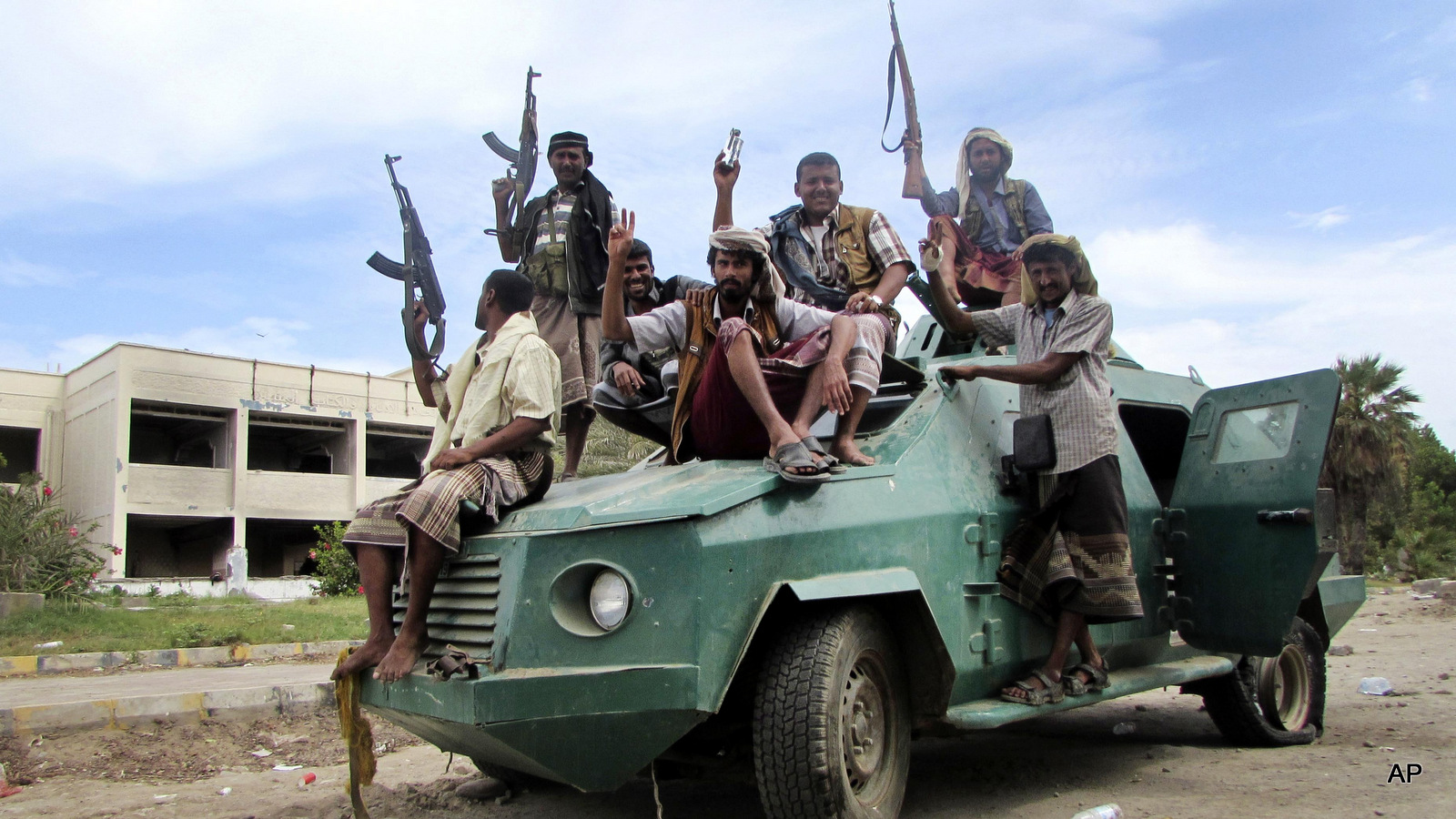 Militiamen loyal to President Abed Rabbo Mansour Hadi ride on an army vehicle on a street in Aden, Yemen. Yemen’s Shiite rebels, backed by supporters of former President Ali Abdullah Saleh, have seized the third-largest city after capturing the capital Sanaa in September, effectively splitting the country in half and hindering U.S. efforts to combat a powerful local al-Qaida affiliate. Hadi, a close U.S. ally, fled house arrest in Sanaa last month and has set up a base in the port city of Aden, the former capital of the once-independent south.
Militiamen loyal to President Abed Rabbo Mansour Hadi ride on an army vehicle on a street in Aden, Yemen. Yemen’s Shiite rebels, backed by supporters of former President Ali Abdullah Saleh, have seized the third-largest city after capturing the capital Sanaa in September, effectively splitting the country in half and hindering U.S. efforts to combat a powerful local al-Qaida affiliate. Hadi, a close U.S. ally, fled house arrest in Sanaa last month and has set up a base in the port city of Aden, the former capital of the once-independent south.
As Houthi forces in Yemen reached the port city of Aden on Wednesday amid conflicting information of the whereabouts of embattled President Abed Rabbo Mansour Hadi, separate reporting indicated that Saudi Arabia is mobilizing its military forces along its southern border—fulfilling predictions of a total breakdown of peace efforts and stoking fears for a wider and more protracted conflict.
Alarms have been ringing this week that the breakdown of peace talks between the government of President Hadi—which has received backing and patronage from the U.S. and Saudi Arabia—and the Shi’ite factions from the north, backed by Yemen’s former President Ali Abdullah Saleh and thought to be receiving at least tacit support from Iran, could lead to a full-scale war inside the country. On Sunday, UN special envoy to Yemen declared that continued fighting and the inability to bring a complex array of Yemeni factions to the table was pushing the impoverished nation to the “edge of civil war”.
Amid the complex and fast-moving situation on Yemen, this curated Twitter feed by Common Dreams hopes to serve as a source of quality updates and trusted perspectives:
Tweets from https://twitter.com/commondreams/lists/trusted-voices-on-yemen
According to reporting by Reuters late Tuesday, citing U.S. officials familiar with the developments, Saudi Arabia was “moving heavy military equipment including artillery to areas near its border with Yemen,” a move seen as raising the risk that the Sunni monarchy and powerful U.S. ally—also the region’s wealthiest and most heavily-armed country—could soon enter the worsening Yemeni conflict.
Reuters reports:
The [Saudi] buildup follows a southward advance by Iranian-backed Houthi Shi’ite militants who took control of the capital Sanaa in September and seized the central city of Taiz at the weekend as they move closer to the new southern base of U.S.-supported President Hadi.
The slide toward war in Yemen has made the country a crucial front in Saudi Arabia’s region-wide rivalry with Iran, which Riyadh accuses of sowing sectarian strife through its support for the Houthis.
The conflict risks spiraling into a proxy war with Shi’ite Iran backing the Houthis, whose leaders adhere to the Zaydi sect of Shi’ite Islam, and Saudi Arabia and the other regional Sunni Muslim monarchies backing Hadi.
On Wednesday morning, Al-Jazeera reports information suggesting Hadi and his top commanders had fled Aden after Houthi forces entered the city, though other reports indicated this was not the case.
As Iona Craig, a UK-based independent journalist who has covered Yemen for years and followed recent developments closely, noted on Twitter:
Hard to tell what’s real and what’s not right now in Yemen.
— Iona Craigأيونا كريج (@ionacraig) March 25, 2015
According to Al-Jazeera:
The developments [in Aden] came just hours after a television station said Houthi fighters and their allies had seized an airbase where US troops and Europeans helped the country in its fight against al-Qaeda.
The Al-Masirah TV station reported that the Houthis had “secured” the al-Annad airbase near the town of Lahij, and claimed the base had been looted by both al-Qaeda fighters and troops loyal to Hadi.
That airbase is only 60km away from Aden, the port city where President Abd- Rabbu Mansour Hadi had established a temporary capital.
Witnesses said they saw a convoy of presidential vehicles leaving Hadi’s palace, located at the top of a hill in Aden overlooking the Arabian Sea, the Associated Press news agency reported.
The advance of the Houthis threatens to plunge the Arab world’s poorest country into a civil war that could draw in its Gulf neighbours. Already, Hadi has asked the UN to authorise a foreign military intervention in the country.
Saud Al Faisal, Saudi Arabia’s foreign minister, had previously warned that his country would take “necessary measures” if the Houthis did not resolve the crisis peacefully, without elaborating further.

